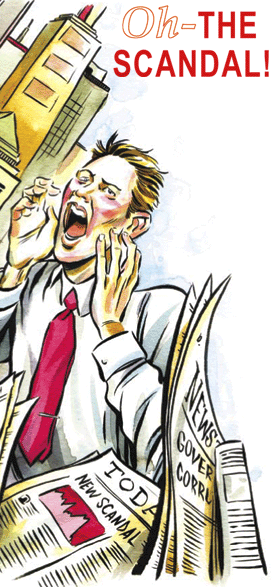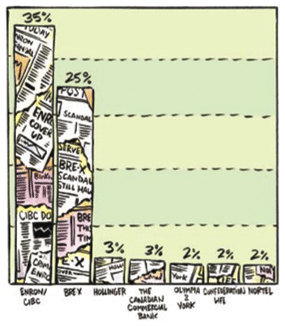 A
SORE SPOT ABOUT A
SORE SPOT ABOUT
GOVERNMENT MALFEASANCE
IS EXPOSED.
WHEN
ASKED TO NAME the
worst business scandal of the past
generation, one percent of our poll
respondents identified the federal
sponsorship debacle. In any other
context, a vote of one percent would
be insignificant, but the fact that
a government scandal got even a scant
mention in a list of ostensible business
scandals speaks volumes as to how
Bay Street feels about the integrity
of our elected officials.
“I think that
business leaders have become very
upset at any thought that only companies
are susceptible to rigged books, misappropriation,
misspending or fraud,” says
Conrad Winn, president of national
polling agency COMPAS Inc., which
surveys executives every week on a
variety of issues. “They always
respond [to questions about corporate
scandals] by saying, ‘Well,
look at what the federal government
is doing.’ ”
The sponsorship scandal
may have gotten only a passing reference
in COMPAS’s poll, but based
on his weekly discussions with corporate
executives, Winn reports that resentment
about the government’s lack
of accountability is paramount in
the minds of Canadian business leaders.
“They are very
aware not only of all of the scandals
in the private sector, but very alert
to all the ones in the public sector,”
says Winn. “They’re amazingly
knowledgeable about accounting, even
if they’re not CFOs.”
Reports of corporate
malfeasance have filled newspapers
in the past few years. Although they
won’t defend business corruption,
many executives feel that government
swindles—like the sponsorship
fiasco, which squandered $100 million
of taxpayers’ money—are
as egregious as any of the recent
accounting scams. (In case you’ve
spent the past five years under a
boulder, in the mid-’90s, the
Liberals handed over a combined $100
million to various communications
agencies to raise the feds’
profile in Quebec. Because these agencies
in some cases appear to have produced
little or no work, opposition parties
allege these payments were meant to
reward Liberal party supporters.)
That’s only
the most prominent example of vice
in the current 11-year reign of the
federal Liberals. There was also the
profligate spending of ex-privacy
commissioner George Radwanski, and
Shawinigate, where former PM Jean
Chrétien expedited a loan for
a hotel in his home riding. Many see
the Liberals’ recent $3.2-billion
purchase of 28 Sikorsky S-92 military
helicopters, meant to replace the
country’s decrepit fleet of
Sea Kings, as another shady deal.
Critics say the S-92s are inferior
to the Cormorants, the competing model
built by a British-Italian consortium
led by AgustaWestland. The allegation
is that the government adjusted the
tendering process, so that the best
helicopters would not win the contract.
“The government
has much lower expectations of its
own behaviour than it has for the
corporate sector,” says one
Toronto business executive, who asked
not to be named. (Few business people
are willing to be quoted on the record
on this topic, largely because most
companies have extensive dealings
with government.) He points out that,
while there are approximately 4,000
public companies in Canada, there
is only one federal government. Granted,
corporations such as Livent, Olympia
& York, Bre-X and YBM Magnex have
each, in their own way, put a taint
on the image of Canadian business,
but they comprise a very small fraction
of Canadian companies, the majority
of which are honest and law-abiding.
“When corporations
do something terrible, and are exposed
for [it], that’s a good thing,”
this business exec says. “That’s
our law, that’s how we keep
people honest. But the governments
are not holding themselves to the
same standard they’d like to
hold the business community.”
He suggests that
businesses have greater checks and
balances than government. A public
company must appease the provincial
securities commission, as well as
the companies that insure its business.
Then there are the rating agencies,
like Standard and Poor’s, which
appraise their bonds and securities.
Then come the audit committees. And
let’s not forget the shareholders,
who have no compunction about asking
the tough questions. If the company
is interlisted, it can also count
on stateside scrutiny.
That said, the various
U.S. accounting scandals proved that
a seemingly objective system could
be flawed. “If the members of
the board are appointed by friends
of the guy who’s in trouble,
if the auditors are also consultants
for the company—as they were
with Enron—and have a financial
interest in not upsetting the client,
if the brokers also have various interests
in not upsetting the client, then
all of these checks and balances come
under a cloud,” says Andrew
Stark, a professor of strategic management
at the University of Toronto. “That’s
the Enron problem, that’s the
Conrad Black problem to a large degree.
The checks and balances have been
compromised or tainted.”
Stark feels that
the federal Liberals have also manipulated
the notion of objectivity. “I
would say that [in the Canadian government]
during the last 10 years, there’s
also been an absence of checks and
balances, because of the centralization
of power in one party, and then the
centralization of that party’s
power in the office of the prime minister,”
he says. “That means that the
prime minister controls what the ethics
counsellor says or does, controls
what parliamentary committees are
allowed to investigate and not allowed
to investigate.”
 The
way that malfeasance is dealt with
at the corporate and government levels
is notable. For the most part, corporations
are forced by law and the market to
take very decisive action in the event
of a scandal. Whether it’s Enron,
Hollinger or the legendary Bre-X scam,
most corporate scandals culminate
in dismissals, insolvency or legal
action. Few government scandals can
claim the same sense of closure. Take
the sponsorship fiasco: like most
political misdeeds, it’s been
a rambling cycle of blame-shifting
and feigned ignorance that will likely
fade into oblivion. The
way that malfeasance is dealt with
at the corporate and government levels
is notable. For the most part, corporations
are forced by law and the market to
take very decisive action in the event
of a scandal. Whether it’s Enron,
Hollinger or the legendary Bre-X scam,
most corporate scandals culminate
in dismissals, insolvency or legal
action. Few government scandals can
claim the same sense of closure. Take
the sponsorship fiasco: like most
political misdeeds, it’s been
a rambling cycle of blame-shifting
and feigned ignorance that will likely
fade into oblivion.
“There are
a lot of [questionable issues] surfacing
with respect to the government,”
says one industry observer, who says
the Canadian public voiced its frustration
in the recent federal election. “It’s
been in the media and it was something
Canadians thought about at the polls.”
Financial markets
can only survive if investors have
faith in their credibility, which
is why corporations have demonstrated
a willingness to root out impropriety.
In 2002, the U.S. government initiated
the Sarbanes-Oxley Act (SOX), which
exerts greater pressure on public
companies in the U.S. to meet regulatory
standards. Although SOX only governs
American firms, its effect has radiated
north of the border, because the fortunes
of Bay Street are so closely tied
to Wall Street, through trade and
investment.
In a speech delivered
to executives in April 2002, John
Hunkin, CEO of CIBC, made a rather
gutsy concession by saying that humans
are by nature unethical, but that
we must fight this impulse, adding
that “we must all take some
responsibility for the ebb and flow
of greed and fear we’ve seen
in the markets.”
“Unethical
behaviour,” he continued, “can
promise many things: survival, a solution
to a conflict or punishment, the opportunity
to exploit or flatter, and self-enrichment.
In business, its impact on both the
innocent and guilty and on social
trust is profound.” Hunkin should
know. According to the U.S. Department
of Justice, some of the loans that
CIBC extended to Enron “aided
and abetted” some dubious transactions,
an allegation that has had a lingering
effect on the bank’s image.
In December, Canadian and American
regulators forced CIBC to pay a US$80
million settlement.
In the speech, Hunkin
said that corporate governance “should
be energetic, noisy, constant and
effective—especially in these
times when management is under increased
pressure to make their numbers.”
For its part, CIBC announced in February
that it would spend $50 million to
set up an “ethics hotline,”
which would allow staff to report
suspicious conduct within the company.
Stark applauds such
initiatives, but remains wary of the
outcome. “I think that systemic
changes can work to some extent, but
not completely,” says Stark.
“When it comes down to it, you
ultimately have to rely on individuals
and their behaviour and judgment.”

— A.M. |